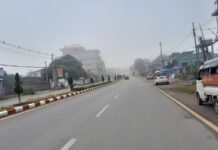[dropcap color=”#dd9933″]R[/dropcap]ecently two reports, watchdog journalism groups Pen Myanmar and Athan, came out one after another which indicated the serious freedom of expression regression within the country for the last two years, ever since the NLD government came to power.
Earlier, Paris-based Reporters Without Borders moved Myanmar down in its annual press freedom index by six places to 137th out of 180 nations, citing legal action against journalists and restrictions on access to conflict-affected areas.
“Journalists increasingly believe that the government, including the military, is the greatest threat to media freedom in Myanmar, both through its continued use of old oppressive laws which it has no real plans to amend and its adoption of new oppressive laws,” according to the report from Athan.

Pen Myanmar
To mark World Press Freedom Day on 2 May 2018, Pen Myanmar released a report titled “Scorecard Assessing Freedom of Expression in Myanmar”, which pointed out: “At the two-year anniversary of the National League for Democracy’s assumption of leadership, PEN Myanmar and its 18 expert partners find there has been either no change with regards to free expression or a worrying regression. They thus award a score of 2 out of a possible 60 points for the 2018 freedom of expression scorecard — a 6 point drop from 2017.”
Accordingly, 10 points are given to each of the following free expression indicators:
- Laws and regulations
- Media independence and freedom
- Digital freedom
- Freedom of assembly, speech, and opinion
- Right to information
- Safety and security
The breakdown of the score for each indicator are: • Laws and regulations: 0.1 (down from 2 in 2017) • Media independence and freedom: 0.4 (down from 1 in 2017) • Digital freedom: 0 (down from 0.6 (rounded up to 1) in 2017) • Freedom of assembly, speech, and opinion: 0.07 (down from 2 in 2017) • Right to information: 1.3 (up from 1 in 2017) • Safety and security: 0.07 (down from 1in 2017).
Points ranking methodology for each indicator are:
0 – regression
1 – no progress
2 – very little progress
3 – a little progress
4 – some progress
5 – average progress
6 – more than average progress
7 – considerable progress
8 – substantial progress
9 – very substantial progress
10 – outstanding progress.
A grim situation assessment was made by a scorecard discussion participant saying: “The NLD government is closing the windows and doors to free expression. We are going backwards.”
Athan
On 10 June 2018, Athan an activist and watchdog journalism group that participated in Pan Myanmar report came up with a detailed investigative report on freedom of expression with recommendations.
The two years compilation report is divided into three parts, which the civilian government’s violations on freedom of expression; Military’s (Tatmadaw) violations on freedom of expression; and situation of the news media regarding freedom of expression.
During the two years of NLD rule, more news reporters were slapped, sued, prohibited, protested and jailed increasingly by the Tatmadaw making use of the Telecommunications Law. As the government have done nothing to discuss, adjust and implement together with the Tatmadaw, it could be said the situation is negative where freedom of expression is concerned, said the Athan Director Maung Saung Kha, according to the BBC report.
The report said while freedom of expression online is being threatened by the section 66(d) of Telecommunications Law, outside of it in daily life people are being threatened and restricted by the Peaceful Assembly and Peaceful Procession Law.
Maung Saung Kha said during the tenure of the new government, the cases that have been sued by using section 66(d) increased up to 113 from just 11 in Thein Sein’s Union Solidarity and Development Party (USDP) regime era, which is the clear indication of threatening the freedom of expression.
Recommendations
From the 12-point recommendation of Pen Myanmar, the following are 6 points crucial to the rehabilitation of the country’s freedom of expression.
- Enact a Right to Information Law that guarantees access to information, establishes mechanisms for implementation, and overrides all other laws, including the 1923 Official Secrets Act. Train government officials on proactive openness and voluntary disclosure of information. Develop government digital platforms that are effective, efficient, and transparent.
- Conduct an open and inclusive public consultation on reforming the following laws to bring them into line with international standards and best practices: Peaceful Assembly and Peaceful Processions Act, Penal Code, Unlawful Associations Act, Electronic Transactions Law, Official Secrets Act, and the Telecommunications Law.
- Implement the Supreme Court strategic plan (passed in early 2018) for reform of the judiciary.
- Adopt a civil defamation law that decriminalizes defamation, including overriding Section 66(d) of the Telecommunications Law.
- Ensure the safety of journalists in war zones, and conflict and disaster areas, as well as journalists reporting on issues of critical public interest and conducting higher risk investigations. To end impunity, conduct thorough investigations and prosecutions of past and current murder and physical attack cases.
- Sign and ratify the International Covenant on Civil and Political Rights (ICCPR) and the optional protocols.
The Athan’s recommendations are more or less quite identical with the Pen Myanmar, although it has directed its concerns to the parliament, government, Tatmadaw, including the judiciary and Myanmar Press Council separately.
The parliament is asked to review, amend, repeal laws that are not according to the international standard and promulgate the necessary laws to protect the public interest with public participation.
The government is encouraged to listen to the people’s voice, create necessary conditions for a free press, draw up a grand strategy to conduct and educate the public on media and digital literacy, to practice data protection for the individual when electronic gadgets are confiscated as witness items, and to abolish state media establishment gradually.
The Tatmadaw should respect the public freedom of speech, rights to obtain news, and its MPs should not obstruct motions and discussions of the other parties’ MPs within the parliament.
The judiciary should uphold the rule of law and independent jury decision-making process, including education on freedom of expression, international standard and digital literacy.
The Myanmar Press Council should try to amend news media, publishing, TV and radio broadcasting. Besides, it should create conditions for freedom of press to flourish and develop a system of internet governance in cooperation with organizations concerned to formulate internet policy.
Perspective
The most critical issue at this juncture is the ongoing civil war, which again is closely connected to some 100,000 Internally Displace Persons in Kachin and Shan States, antiwar movements and friction with Peaceful Assembly and Procession Law, leading to the argument that have to do with freedom of expression.
The gaining of antiwar momentum that spreads from Myitkyina to other big cities like Mandalay, Yangon, Pathein and so on again has created confrontation between the security forces and the demonstrators.
The government security forces, most probably with the directive from authorities concerned to keep the antiwar crowd on the short leash using Peaceful Assembly and Peaceful Procession Law literally and rigidly, just like the recent episode in Myitkyina, isn’t doing anybody any good.
Thousands of people attended a prayer event to mark the 7th anniversary collapse of a 17-year truce between the Tatmadaw and the Kachin Independence Army (KIA) on June 9, 2011.
Reportedly, organizers had received official approval for the assembly. According to police, however, as they continued the event beyond the permitted time and staged a drama for which permission had not been granted, they would be charged under Article 19 of the Peaceful Assembly and Procession Law.
Given such circumstances, an understanding and cooperation between the military and civilian authorities with broad mindedness will go a long way to reconcile the rift between the antiwar protesters and the government, including the news media organizations. This in turn would be a start to stop the freedom of expression downward spiral and eventual reinstating one of the most important norms in democratization process.











Leave a Comments